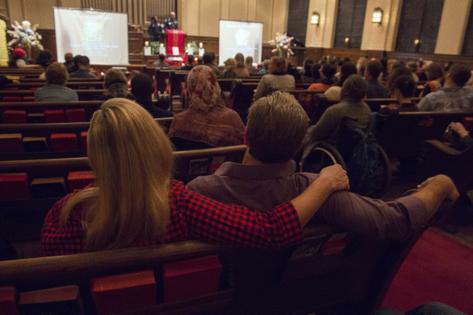Legislation to restructure United Methodists moves forward
Published in Religious News
United Methodist delegates have overwhelmingly endorsed a constitutional amendment many say could defuse debates over the role of LGBTQ people in the church. The amendment, approved Thursday at the denomination’s gathering in Charlotte, N.C., gives each region of the international church the ability to make their own decisions on divisive issues.
The plan would create multiple regional conferences for the worldwide denomination — one for the United States and others covering areas ranging from the Philippines to Europe to Africa.
The vote total easily passed the two-thirds majority required for an amendment to the United Methodist Church’s constitution. To become official, however, it will require approval by two-thirds of its annual conferences, or local governing bodies.
The next annual conference for the UMC North Georgia Conference is in June in Athens, but spokeswoman Sybil Davidson said the issue won’t come before the body until next year.
“It has been a long journey towards this day,” the Rev. Byron Thomas, chairman of the North Georgia Conference’s delegation, said in a statement, calling it a historic day within the denomination. “I could not be more proud to be part of those who voted along with so many others in favor of this proposal.”
Existing UMC regions outside the United States — known as central conferences — already have the flexibility to adapt church rules to their local contexts, but the jurisdictions in the United States do not. This constitutional change would give the U.S. church that flexibility, while defining autonomy more closely for all of the regions.
The measure comes during the first General Conference to be held since one-quarter of U.S. congregations left the denomination over the past four years — most of them conservative churches reacting to the denomination’s failure to enforce rules against same-sex marriage and LGBTQ ordination.
Many African churches, where congregations are growing faster than in the United States, are more conservative than their U.S. counterparts. In previous General Conferences they have largely opposed any moves to change the language regarding human sexuality.
Since 2022, more than 330 churches have left the UMC’s North Georgia Conference, which covers the state north of Macon. That represents about 38% of the conference’s churches and 27% of its members. Today the conference has about 440 churches remaining — but nearly a dozen new congregations are forming.
The smaller South Georgia Conference of the UMC has lost about half of the congregations since 2020, according to spokeswoman Kelly Roberson. The South Georgia Conference, which includes the area south of Macon, currently has 274 congregations, which includes established churches, missional congregations, and new church starts.
The Rev. Vance P. Ross, pastor of Central United Methodist Church in Atlanta, has been watching the conference online. Ross was not initially in favor of regionalization but over time changed his mind. He views the vote as a positive that will allow conferences to make decisions that align more within their culture and context.
”There’s a difference between my native West Virginia and New York City,” he said. “So there are rules and laws written in and for the the state of West Virginia that would not be applicable in the same way to the state and city of New York. That’s’ what regionalization does. It recognizes the cultural and geographic differences for clergy and lay persons in those places.”
He said the future is unknown at this moment, but the vote yesterday could pave the way for removing the language around human sexuality, although it does not change the constitution.
“The big change this petition brings is really for our brothers and sisters here in the United States, where you would finally be given the right to decide things which only concern you among yourselves, the same right that we have enjoyed for a long time,” said Christine Schneider-Oesch of Switzerland, a member of the committee proposing the changes.
The Book of Discipline outlines the doctrine, administration, organizational work and procedures of the UMC. The doctrines are not adaptable. Currently the Book of Discipline considers homosexuality to be incompatible with Christian teaching. It prohibits clergy from performing same sex marriages or union ceremonies and doesn’t allow “self-avowed practicing” members of the LGBTQ community to be ordained or consecrated as a bishop.
LGBTQ issues weren’t central to the debate on Thursday, but they are expected to arise in the coming days at the General Conference. Some proposals would lift the current bans on ordaining LGBTQ people and on same-sex marriage.
“I believe that the values upon which worldwide regionalization is rooted will give renewed strength, life and vitality to the church,” said the Rev. Jonathan Ulanday of the Philippines. He said it gives autonomy while maintaining connection to the worldwide denomination, which he noted has been helpful in areas ranging from disaster relief to aiding Filipinos working abroad.
But the Rev. Forbes Matonga of Zimbabwe said the plan actually perpetuates colonial structures by creating multiple regional conferences in Africa along national lines, compared with a single one in the United States. He noted that many African national borders were created arbitrarily by European colonial mapmakers.
“It is this divide and rule,” Matonga said. “Create a region for Africans. Creates a platform for Africans so that we speak as a continent and not as small colonies.”
The Rev. Ande Emmanuel of Nigeria said he has been to multiple General Conferences and that many of the discussions are “U.S.-centric,” not relevant to African delegates. Regionalization would let each area of the church manage such issues, he said. “We are not here to control the Americans,” he said. “Neither are our brothers from America here to control us. We are trying to build a platform that is mutual. We’re trying to build an understanding that would move our church together.”
-------
©2024 The Atlanta Journal-Constitution. Visit at ajc.com. Distributed by Tribune Content Agency, LLC.







Comments